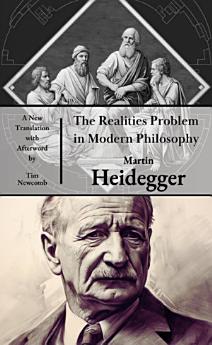The Realities Problem in Modern Philosophy
२०२४ मे · The Collected Early Works of Martin Heidegger पुस्तक 6 · Minerva Heritage Press
इ-पुस्तक
76
पृष्ठहरू
family_home
योग्य
info
reportरेटिङ र रिभ्यूहरूको पुष्टि गरिएको हुँदैन थप जान्नुहोस्
यो इ-पुस्तकका बारेमा
A new translation of Heidegger's early work "The Realities Problem in Modern Philosophy '', originally published in 1912 under the German title "Das Realitats Problem in der Modernen Philosophie". This edition contains a new afterword by the Translator, a timeline of Heidegger's life and works, a philosophic index of core Heideggerian concepts and a guide for Existentialist terminology across 19th and 20th century Existentialists. This translation is designed for readability and accessibility to Heidegger's enigmatic and dense philosophy. Complex and specific philosophic terms are translated as literally as possible and academic footnotes have been removed to ensure easy reading. This work is critical to understand his initial approach to Ontochronology, leading to his advanced theories on the Phenomenology of Time in his major work "Being and Time". Heidegger argues here that time in the historical sciences is not a homogeneous, mathematical series as it is in physics, but rather a qualitative, context-dependent concept. He emphasises the importance of understanding time in relation to the specific aims and methodologies of historical science, and posits that time in history has a unique meaning and function, deeply bound up with the cultural and human context of historical events. This approach reflects a broader philosophical inquiry into the nature of being and temporality that Heidegger would develop in his later works. Metaphysics has triumphed over Rationalism and Empiricism as the only field that is vectored towards "the only question that matters".
लेखकको बारेमा
Martin Heidegger (1889-1976) was a German philosopher and one of the most influential thinkers of the 20th century, particularly in the fields of phenomenology, existentialism and Ontochronology. His seminal work, Being and Time (Sein und Zeit), introduces the concept of "Dasein," or "being-there," as a way to explore the nature of human existence, focusing on temporality and the meaning of being. Heidegger challenged traditional Western metaphysics by emphasizing the situatedness of human beings within their world, a concept he described as "being-in-the-world." Though his brief association with the Nazi party has cast a shadow over his legacy, Heidegger's ideas have profoundly impacted disciplines such as philosophy, psychology, literature, and theology. His critiques of technology and "technological thinking" continue to resonate in contemporary discussions on modernity, alienation, and the essence of human existence.
यो इ-पुस्तकको मूल्याङ्कन गर्नुहोस्
हामीलाई आफ्नो धारणा बताउनुहोस्।
जानकारी पढ्दै
स्मार्टफोन तथा ट्याबलेटहरू
Android र iPad/iPhone का लागि Google Play किताब एप को इन्स्टल गर्नुहोस्। यो तपाईंको खातासॅंग स्वतः सिंक हुन्छ र तपाईं अनलाइन वा अफलाइन जहाँ भए पनि अध्ययन गर्न दिन्छ।
ल्यापटप तथा कम्प्युटरहरू
तपाईं Google Play मा खरिद गरिएको अडियोबुक आफ्नो कम्प्युटरको वेब ब्राउजर प्रयोग गरेर सुन्न सक्नुहुन्छ।
eReaders र अन्य उपकरणहरू
Kobo eReaders जस्ता e-ink डिभाइसहरूमा फाइल पढ्न तपाईंले फाइल डाउनलोड गरेर उक्त फाइल आफ्नो डिभाइसमा ट्रान्स्फर गर्नु पर्ने हुन्छ। ती फाइलहरू पढ्न मिल्ने इबुक रिडरहरूमा ती फाइलहरू ट्रान्स्फर गर्नेसम्बन्धी विस्तृत निर्देशनहरू प्राप्त गर्न मद्दत केन्द्र मा जानुहोस्।











